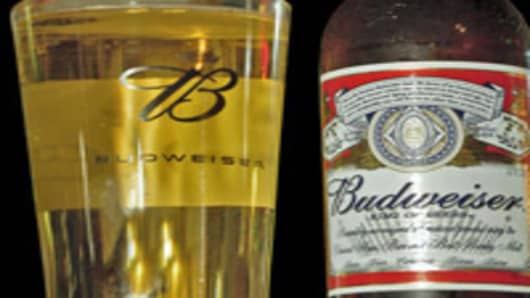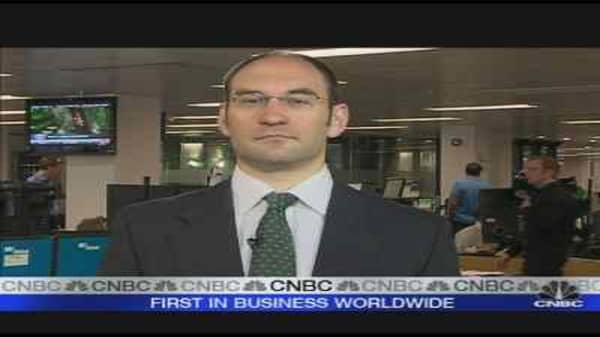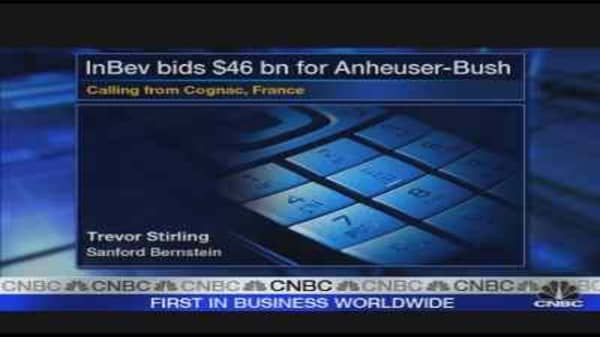InBev's brands include Stella Artois and Beck's. Anheuser dominates the U.S. beer market with a 48.5 percent share.
The offer could be just an opening step in negotiations, Christoper Gower, senior equity analyst at MF Global told "Worldwide Exchange." "I think they will probably settle above $70 (a share)," Gower said, citing the precedent created by the bidding war in the Scottish and Newcastle acquisition by Carlsberg and Heineken.
Anheuser, the maker of Budweiser and Michelob, which counts Warren Buffett's Berkshire Hathaway as its second-largest shareholder with a 5 percent stake, saw its shares jump more than 7 percent to $62.73 after-hours on Wednesday.
InBev shares closed 6.2 percent higher at 50.2 euros ($77.31) in Belgium while Anheuser-Busch surged more than 6 percent in New York trading.
"Friendly Combination"
Belgium-based InBev, formed by the 2004 merger of Belgium's Interbrew with Brazil's AmBev, said it would "like to engage in a dialogue with the goal of consummating a friendly combination".
St. Louis-based Anheuser said its board of directors "will evaluate the proposal carefully and in the context of all relevant factors, including Anheuser-Busch's long-term strategic plan", and make a determination regarding the proposal "in due course."
The two brewers already have deals whereby Anheuser distributes InBev beers including Bass Pale Ale, Hoegaarden and Leffe in the United States and InBev distributes Anheuser beers in Canada.
The move will offer good value to Anheuser shareholders, Stirling said. "I think the price is a really good one," he said. It will also increase the combined company's profitability, since InBev "has a good track record in increasing profitability in mature markets."
The bid is unlikely to be challenged by a rival offer, since "the global brewing giants are all occupied or conflicting," according to Stirling.
But Anheuser-Busch will probably fight to get the price up, especially in an election year when protectionist rhetoric is likely to increase.
"I think it's going to take a few weeks before we get a dialogue established with the two players at the same table," Gower said.
There have already been arguments against the deal, saying it would cost American jobs and end American ownership of an iconic brand.
Missouri Gov. Matt Blunt said Wednesday he opposes the deal, and the Republican directed the Missouri Department of Economic Development to see if there was a way to stop it, the Associated Press reported.
But shareholders are likely to look at the advantages of a merger, such as the possibility of U.S. products to be sold in Europe and Asia and the benefits of cost cuts, Gower said.
"The way the markets are at the moment … I think the investors will take a cold, hard look at the proposals and say in this environment owning these shares could make me a lot of money," he added.
Industry Consolidation
The beer industry is undergoing a wave of consolidation, with Scottish & Newcastle agreeing to be broken up by Carlsberg and Heineken and SABMiller and Molson Coors Brewing agreeing to merge their U.S. operations.





